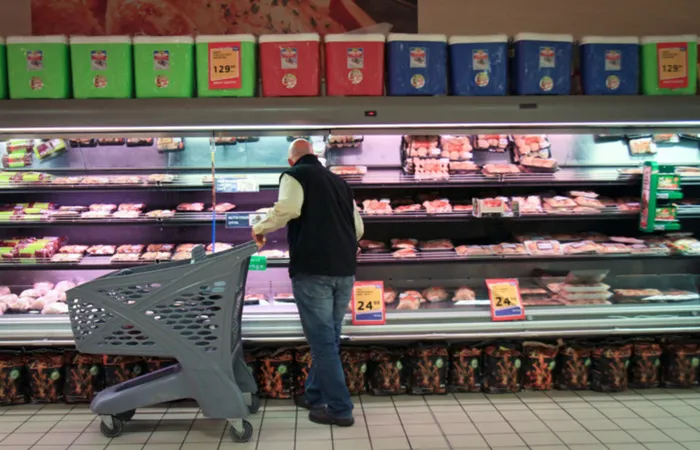Food inflation eases for second month, offering relief for consumers
CONSUMER

There has been welcome reaction to Wednesday’s announcement that food inflation is declining for the second month in a row
Image: Bloomberg
There has been widespread welcome to the announcement by Statistics South Africa (Stats SA) that food inflation has declined for the second consecutive month — offering some relief to consumers after months of high prices.
According to the Agricultural Business Chamber of South Africa (Agbiz), consumer food price inflation slowed to 4.4% in September 2025, down from 5.2% in August.
The moderation comes despite headline consumer inflation (CPI) edging slightly higher to 3.4% from 3.3% in the previous month.
Wandile Sihlobo, chief economist at Agbiz, said the decline was driven primarily by lower prices for fruit and nuts, vegetables, oils and fats, milk and dairy products.
“The price inflation of cereal products also remained fairly moderate, which illustrates the benefits of the ample harvest and the easing of grain prices at the farm level.”
He added that fruit, nut, and vegetable price inflation had also dropped significantly due to strong supplies. However, meat prices remain relatively high.
“As with the previous month, a key product we are closely monitoring is meat, which has remained somewhat elevated, although slaughtering has resumed in major feedlots across the country.”
Sihlobo noted that South Africa’s 2024/25 summer grains and oilseed harvest—estimated at 19.94 million tons, up 28% year-on-year—would continue to support food price stability in the months ahead.
“We remain optimistic that South Africa's consumer food price inflation will continue to moderate. The lingering upside risk is the impact on meat prices, as foot and mouth disease remains a challenge. The initial challenge with meat price inflation was the panic buying,” he said.
While economists view the overall decline as positive, some consumer advocates warn that the benefits may not be evenly felt across income groups.
Mervyn Abrahams, Director of the Pietermaritzburg Economic Justice and Dignity Group (PMBEJD), said lower prices for some food items—particularly vegetables—were welcome, but rising meat prices continued to hurt households.
“The decrease in some of the vegetables is certainly good news for consumers. However, this is nullified by meat prices that have continued to rise over the period,” Abrahams said.
“As a reminder, chicken and meat are important sources of protein for everyone, varying from children right up to adults, and therefore when prices are high, it means that individuals and households are deprived of this important source and this impacts on their health and wellbeing.”
He added that 2025 has been particularly difficult for low-income households, with rising utility costs and stagnant wages eroding purchasing power. “Any form of relief is likely to be minimal,” he cautioned.
Evashnee Naidu, KwaZulu-Natal regional manager at Black Sash, said the easing food inflation was a positive sign heading into the festive season.
“This has also been backed by figures that we have seen in terms of the trends of food purchases from consumers. Whilst Black Sash notes that the price of meat continues to remain high, other basic food items are reducing in price, which are of significant benefit to households surviving on social grants and those with little to no income,” Naidu said.
She added that Black Sash hopes that this trend will continue, particularly into the festive season, to ensure that households can have access to basic necessities to enjoy the festive season, which will be an improvement over previous years.
“Nutrition and food security are critical factors to ensure that people in South Africa live with dignity, and Black Sash urges the government and the private sector to work together to ensure access to food security.”
BUSINESS REPORT